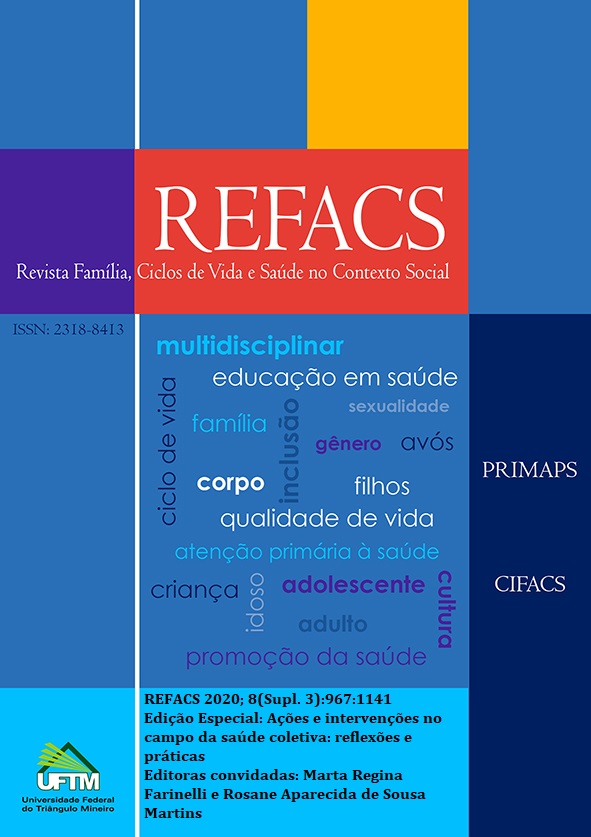Memórias do patrimônio alimentar romano: uma reflexão
DOI:
https://doi.org/10.18554/refacs.v8i0.5030Palavras-chave:
Dieta, Cultura, História, Mundo romano.Resumo
Trata-se de uma reflexão, com base em estudos históricos, e com o objetivo de se refletir acerca da evolução alimentar e rituais da antiga civilização romana. Esta reflexão foi estruturada a partir dos questionamentos: Qual a origem alimentar da civilização romana? Que diálogo existe entre a alimentação e a cultura romana? Quais os padrões alimentares da sociedade romana e a significação simbólica atribuída aos alimentos? Apresentou-se os seguintes eixos temáticos: Origem alimentar civilizacional romana; Aspetos da cultura romana; Padrões alimentares da sociedade romana; e Significação simbólica dos alimentos. Verificou-se que havia deficiente alimentação, como a carência de vitaminas e minerais, derivada de desigualdades sociais em comunidades pobres, e uma alimentação exuberante para os ricos, o que influenciou o estilo alimentar e a forma de vida do povo romano. Também, a expansão do império romano apontava forte influência grega, mística e religiosa, bem como no processo saúde-doença. Na compreensão do progresso de uma sociedade, a alimentação é uma estratégia interpretativa dos costumes e valores e, amplia a tomada de consciência da memória do passado de um povo.
Referências
Bustamante RMC. “Diz-me o que comes e te direi quem és”: uma representação musiva de xênia na África Romana. In: Soares C, Macedo IC, organizadores. Ensaios sobre o património alimentar Luso – brasileiro. Coimbra, Portugal: Imprensa da Universidade de Coimbra; 2014. p. 51-68
Henrique N. Hábitos alimentares no Império romano: notícias sobre os comportamentos animais e habitats no de alimentorum facultatibus de Galeno. In: Soares C, Dias PB., organizadores. Contributos para a história da alimentação na antiguidade. Coimbra, Portugal: Imprensa da Universidade de Coimbra; 2012. p. 57-67
Carneiro HS. Comida e sociedade: significados sociais na história da alimentação. Hist Quest Debates (Curitiba) [Internet]. 2005 [citado em 06 out 2020]; 42:71-80. Disponível em: https://revistas.ufpr.br/historia/article/view/4640/3800
Lima MFF. Comida como cultura [Resenha]. Rev Ciênc Soc. [Internet]. 2009 [citado em 06 out 2020]; 40(1):107-11. Disponível em: http://www.periodicos.ufc.br/revcienso/issue/view/69
Centeno R. Civilizações clássicas II – Roma. Lisboa, Portugal: Universidade Aberta; 2007.
Lívio T. História de Roma. Volume 1, Cap. 1. Brasil: Paumape; 2018. p. 33-85.
Paterniani E. Agricultura sustentável nos trópicos. Est Avanç. [Internet]. 2001 [citado em 18 dez 2019]; 15(43):307-24. Disponível em: https://www.scielo.br/pdf/ea/v15n43/v15n43a23.pdf
Funari PP. Grécia e Roma. São Paulo: Alameda Casa Editorial; 2001.
Gonçalves JW. Roma e a questão geográfica. Biblos: Rio Grande; 2005.
Campos, A. Alimentação dos romanos pode ter contribuído para a queda do império [Internet]. National Geographic Portugal, Grandes Reportagens História; set 2014 [citado em out 2019]. Disponível em: https://nationalgeographic.sapo.pt/historia/grandes-reportagens/1421-comida-romanos-set2014
Flandrin JL, Montanari M. História da alimentação II: da idade média aos tempos actuais. Lisboa, Portugal: Terramar; 2001.
Purcell N. The way we used to eat: diet, community, and history at Rome. Am J Philol. [Internet]. 2003 [citado em 22 out 2019]; 124(3):329-58. Disponível em: https://muse.jhu.edu/article/47134/pdf
Brandão J, Oliveira F. História de Roma Antiga: das origens à morte de César. Coimbra, Portugal: Imprensa da Universidade de Coimbra; 2015. v. 1.
Downloads
Publicado
Edição
Seção
Licença
Este trabalho está licenciado sob uma licença Creative Commons Attribution-NonCommercial 4.0 International License.



